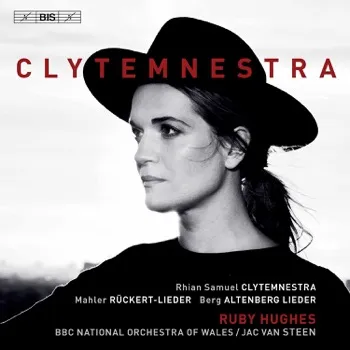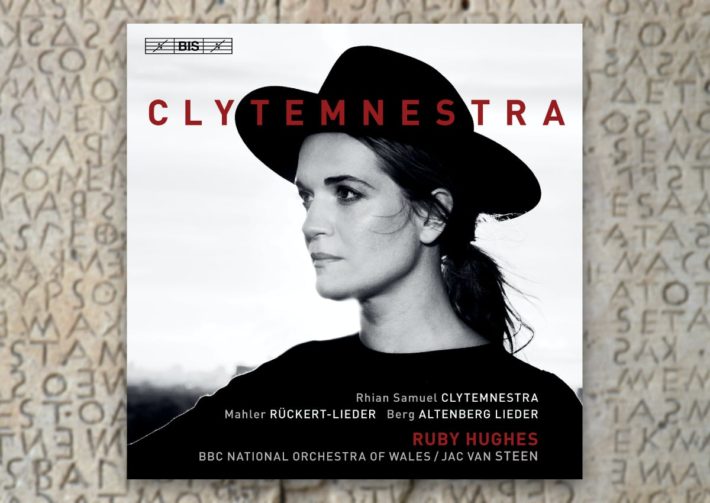This intriguing album programs three generations of composers, each represented with a substantial composition for Soprano and orchestra. Mahler‘s “Rückert Lieder” is followed by Alban Berg’s “Altenberg Lieder” and “Clytemnestra”, a song cycle for soprano and orchestra published in 1994 by composer Rhian Samuel.

Mahler’s Rückert Lieder have been recorded many times over by great singers; what Hughes brings to her interpretation is a refreshing balance of expressivity, lightness, and clarity. “Blicke mir nicht in die Lieder” is buoyant and energetic: this is particularly interesting in comparison to Christa Ludwig, whose timbre of voice lends a more robust character to the song. In “Ich atmet’ einen linden Duft”, Hughes’ controlled sostenuto is admirable and quite fitting for the gentle nature of the words.
The best performance of the set is “Ich bin der Welt abhanden gekommen” (track 3), with strong performances by both orchestra and singer. The woodwind solo brings to light the poem’s contemplativeness and melancholy. Hughes, too, is deeply meditative, capturing the essence of solitude. Her lines are long and well-contoured, and the richness of her voice carries a sense of longing. There is a seamless intertwining of voice and orchestra throughout, creating a stunning dialogue. And the orchestra provides a great deal of harmonic color that both supports and complements the soloist. An intriguing comparison here is Renée Fleming’s 2019 live recording (Decca, reviewed on these pages), which is in some ways more emotionally charged, reflecting her tragic interpretation of the poem.
Alban Berg composed the five “Altenberg Lieder”, Op. 4 in 1911 to 1912, drawing inspiration from the short writings of Viennese poet Peter Altenberg. Berg’s musical language (which at this point started to explore the concept of twelve-tone serialism and pitch classes) speaks very much to Altenberg’s writing style, creating for the listener a sense of mystery and even unrest. Hughes and the orchestra deliver a solid interpretation. In the first song, the substantial orchestral opening is effective, presenting a vibrant metamorphosis of emotions: a shimmering sense of mystery quickly metamorphosizes into a cataclysmic drama.
While undoubtedly beautiful and sensitive, Hughes seems just a little overpowered. The suppleness of her voice does not quite hold up to the robustness of the orchestral part. Listen, in comparison, to Jessye Norman’s recording with Pierre Boulez (Sony, 1995). Norman’s voice is thick and rich, truly operatic; this helps carry her over the denseness of the orchestra. The second song showcases Hughes’ excellent diction, intonation, and phrasing, thus counterbalancing the angular, almost disjointed nature of the melodies. What results is delicate and lyrical.
The singer’s strongest performance lies in “Hier ist Friede” (track 10). The subject matter (peace as a release from pain) is reflected in this Passacaglia, which is probably the most compositionally complex, dense, and large-scale of the five songs. Hughes, here, holds good weight against the orchestra in the most dramatic moments. Her voice is wrought with despair, bringing to life a text that describes a burning pain within the soul. She also has the ability to transform her voice timbre effortlessly to express the most subtle shades of melodic color (such as in the last stanza of the song), expressing peace as a quiet and solitary entity.
Bone-Chilling Compositional Language
“Clytemnestra” (1994) draws its libretto from Clytemnestra’s speeches in “Agamemnon”. This gives the listener a chance to explore the emotional journey of the titular character following the death of her daughter and her consequent killing of her own husband. Rhian Samuel’s compositional language is dark, complex, and at many times, bone-chilling. The performance is superb, so intense that the listener must give it his or her undivided attention. Agamemnon’s Return is one of the best of the cycle, making the listener feel truly immersed in the story (track 13).
The orchestra opens with a scurrying figure that transforms into an expansive and terrifying section of dissonance. The singer’s full range of musicality is on display here: one moment, she powerfully commands attention (“Step down from your chariot”), but in the next shows extremely nuanced control of a legato line. “The Deed” (track 14) is quite interesting. Describing the murder itself, the voice is surprisingly absent (there is a bass guitar solo instead). Perhaps this allows us, free from words, to experience the high point of the story personally and imaginatively.
The shortness of the movement should not discount its intensity: a pure cacophony of sound vividly reflects the emotional and psychological horror of the murder. Confession conveys Clytemnestra’s complex anguish, but also gives the singer her moment of virtuosity. The end (“Yes, this is my work; I claim it”) is executed with impeccably clean articulation, and “Defiance” is yet another impressive performance. A contrast from the other movements with its ironic, almost sardonic nature, what stands out particularly is the line “My love, torn from my womb.” Here, Hughes expresses Clytemnestra’s pain, and it is at this point that we understand what has truly driven the character into a murderous madness.
The liner notes provide a concise yet informative introduction to each set of songs. Rhian Samuel’s own writing on Clytemnestra provides an invaluable background on her compositional process.
“Clytemnestra”
Mahler – Rückert-Lieder
Berg – Altenberg Lieder
Samuel – Clytemnestra
Ruby Hughes – Soprano
BBC National Orchestra of Wales
Jac van Steen – Conductor
BIS Records, Hybryd SACD BIS-2408




















